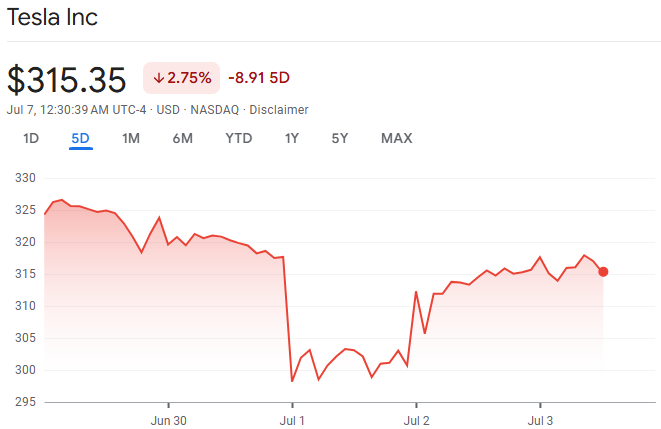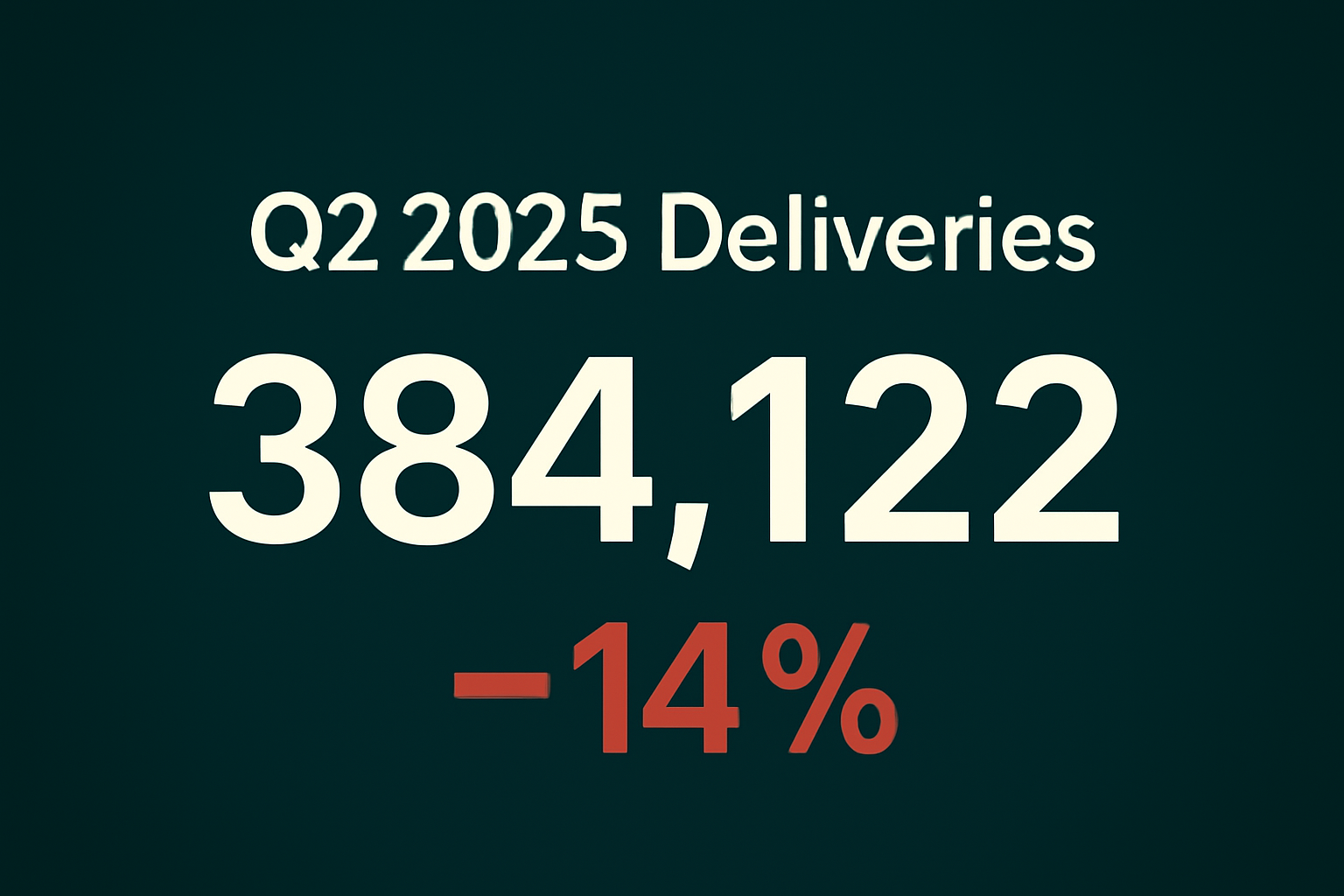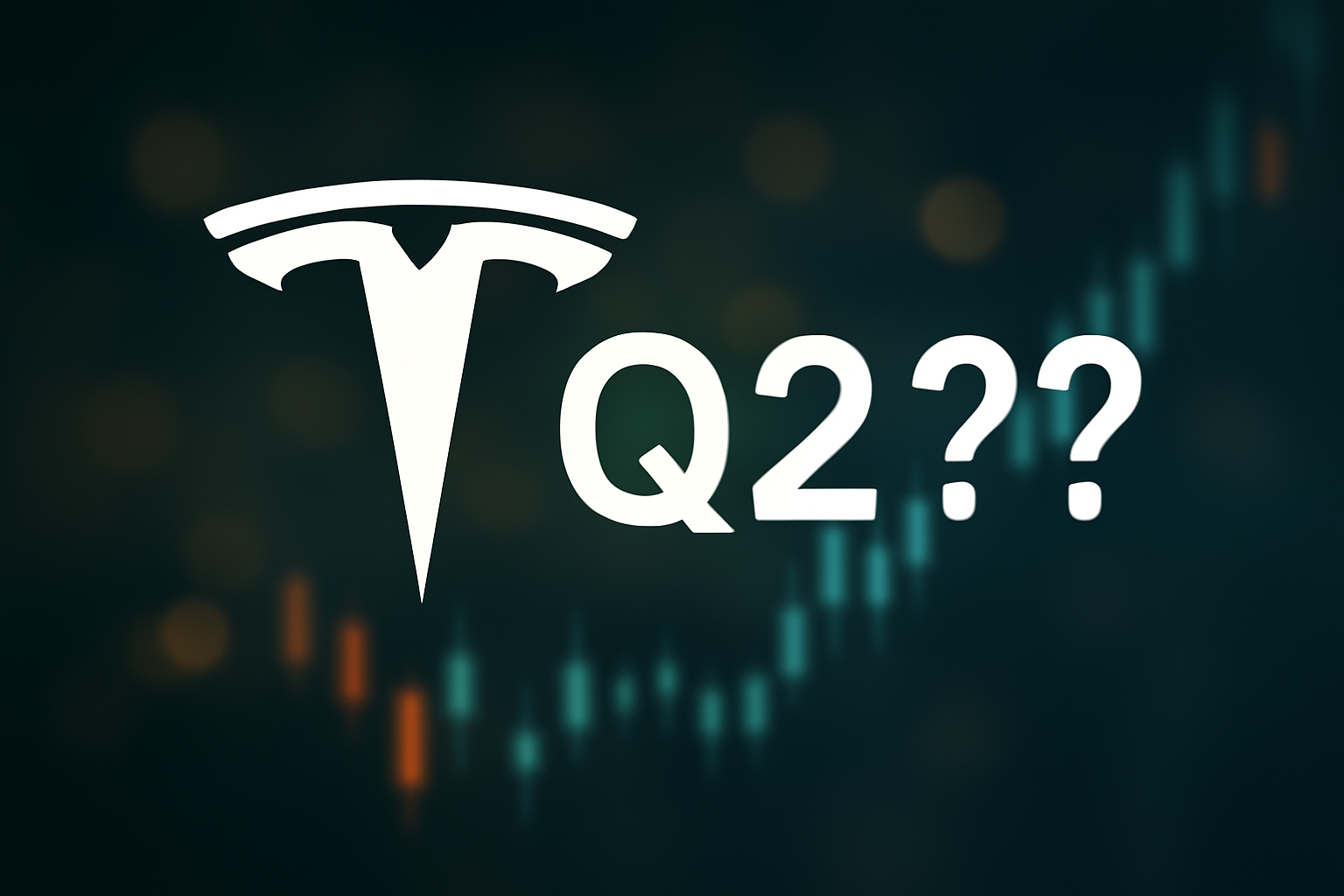Tesla's stock experienced a sharp 6% decline on 1 July 2025, marking another volatile session for the electric vehicle manufacturer as investors grappled with mounting political uncertainties and disappointing delivery figures.
The selloff, which saw shares fall to around $300, underscores deeper structural challenges facing the company as it navigates an increasingly competitive EV landscape and regulatory scrutiny.
Tesla Stock Volatility: What Drove the 6% Drop

The 6% plunge on 1 July was triggered by President Trump's announcement of an investigation into subsidies tied to Elon Musk, sending shockwaves through the market. This political development came at a particularly sensitive time for Tesla, as investors were already digesting weaker-than-expected Q2 delivery data and concerns about the company's long-term growth trajectory.
Tesla's stock opened sharply lower and continued to decline throughout the session, with trading volumes significantly elevated compared to recent averages. The move represented one of the largest single-day declines for the stock in recent months, highlighting the market's sensitivity to both company-specific and external factors.
Recovery and Subsequent Performance
Following the initial selloff, Tesla shares showed resilience in subsequent trading sessions. On 2 July, the stock rebounded strongly, gaining approximately 5.2% to close at $315.65, as investors viewed the previous day's decline as an overreaction. However, the recovery proved short-lived, with shares closing virtually flat at $315.35 on 3 July before markets closed for the Independence Day holiday.
This pattern of sharp declines followed by partial recoveries has become characteristic of Tesla's trading behaviour in 2025, reflecting the ongoing uncertainty surrounding the company's prospects and the broader EV sector.
Underlying Issues: Deliveries, Politics, and Margins

Disappointing Q2 Delivery Numbers
Tesla's Q2 2025 delivery figures of 384,122 vehicles represented a 14% year-over-year decline, falling short of analyst expectations of 394,000-395,000 units. This marked the second consecutive quarter of declining deliveries, raising questions about demand sustainability in key markets including China and Europe.
The production shortfall was equally concerning, with 410,244 vehicles produced during the quarter, missing consensus forecasts. These figures have intensified concerns about Tesla's ability to maintain its market leadership position as traditional automakers and Chinese competitors ramp up their EV offerings.
Political and Regulatory Headwinds
The ongoing public disputes between CEO Elon Musk and political figures have created additional volatility for Tesla shares. The investigation into subsidies represents the latest escalation in tensions that have periodically weighed on investor sentiment throughout 2025.
These political risks extend beyond immediate regulatory concerns, potentially affecting Tesla's access to government contracts and incentives that have historically supported the company's growth. The uncertainty has led some institutional investors to reduce their exposure to Tesla, contributing to the stock's underperformance.
Margin Compression Concerns
Tesla's aggressive pricing strategy to maintain market share has come at the cost of profitability. The company's automotive gross margins have compressed significantly as it has implemented multiple price cuts across its model range. This strategy, while helping to stimulate demand, has raised questions about the sustainability of Tesla's profit margins in an increasingly competitive environment.
Analysts warn that further price reductions may be necessary to defend market share, particularly as new models from Chinese manufacturers and legacy automakers enter the market at competitive price points.
Analyst Reactions and Market Sentiment
The recent volatility has prompted mixed reactions from Wall Street analysts. Wells Fargo reiterated its underweight rating on Tesla, citing deteriorating fundamentals and maintaining a price target that implies significant downside from current levels. The firm highlighted concerns about demand sustainability and margin pressure as key factors supporting its bearish stance.
Conversely, some analysts remain optimistic about Tesla's long-term prospects, pointing to the company's leadership in autonomous driving technology and its upcoming robotaxi programme. However, these longer-term catalysts have yet to offset near-term operational challenges.
Options market activity suggests traders expect continued volatility, with implied volatility measures remaining elevated compared to historical averages. This reflects the market's uncertainty about Tesla's near-term direction and the potential for further sharp moves in either direction.
Broader EV Market Context
Tesla's challenges are occurring against a backdrop of broader headwinds facing the EV sector. Global EV sales growth has decelerated in 2025, with concerns about charging infrastructure, battery costs, and consumer adoption rates weighing on the entire industry.
The competitive landscape has intensified significantly, with Chinese manufacturers like BYD and traditional automakers such as Ford and General Motors launching compelling EV offerings. This increased competition has pressured Tesla's market share and forced the company to compete more aggressively on price.
Looking Ahead: Key Catalysts and Risks

Several key events will likely determine Tesla's stock performance in the coming weeks and months:
Q2 Earnings (23 July 2025): Tesla's upcoming earnings report will provide crucial insights into the company's financial health, margin trends, and management's outlook for the remainder of 2025. Investors will be particularly focused on commentary regarding demand trends and the company's pricing strategy.
Robotaxi Programme Updates: Progress on Tesla's autonomous driving capabilities and robotaxi rollout remains a key long-term catalyst. Any significant developments could help offset near-term operational concerns.
Regulatory Environment: The outcome of ongoing investigations and potential changes to EV incentives will significantly impact Tesla's operating environment and profitability.
Global EV Market Trends: Broader adoption rates and competitive dynamics in key markets will continue to influence Tesla's growth prospects.
Conclusion
Tesla's 6% drop on 1 July 2025 serves as a stark reminder of the volatility inherent in the stock and the multiple challenges facing the company. While the immediate selloff was triggered by political developments, the underlying issues of declining deliveries, margin pressure, and intensifying competition represent more fundamental concerns.
The stock's subsequent recovery attempts suggest that investor sentiment remains divided, with bulls pointing to Tesla's technological leadership and long-term potential, while bears focus on near-term operational challenges and valuation concerns. As Tesla approaches its Q2 earnings report, the company will need to demonstrate progress on multiple fronts to restore investor confidence and reduce the volatility that has characterised its stock performance throughout 2025.
Disclaimer: This material is for general information purposes only and is not intended as (and should not be considered to be) financial, investment or other advice on which reliance should be placed. No opinion given in the material constitutes a recommendation by EBC or the author that any particular investment, security, transaction or investment strategy is suitable for any specific person.
























